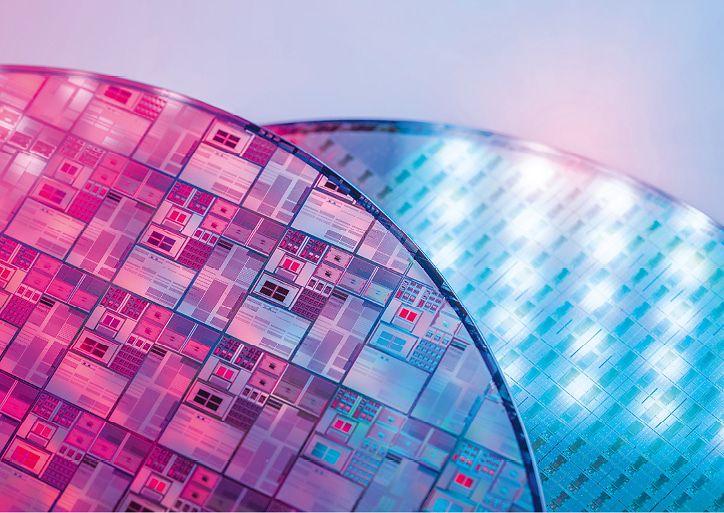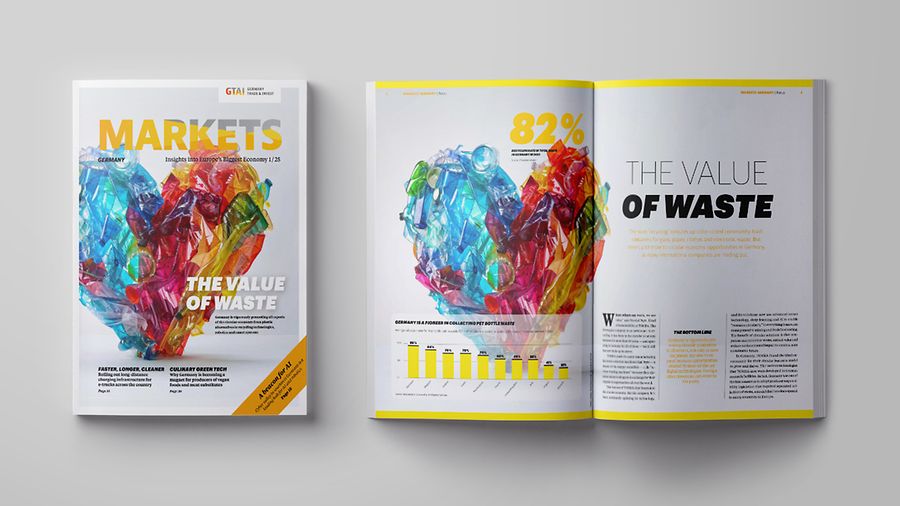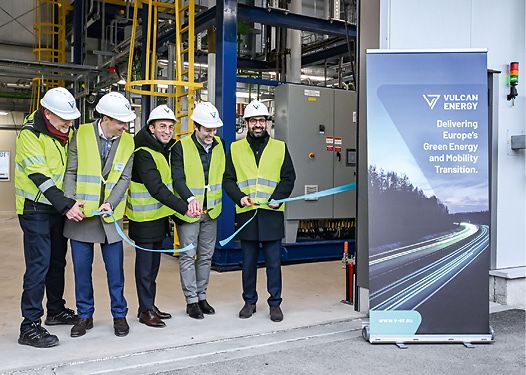Markets Germany Magazine 1/25 | Innovations
Innovations
The global business community admires the spirit of invention that drives the German economy. Here we highlight some of the most intriguing trends and research projects.
May 13, 2025
Software Saxony
The growing demand for software solutions is driving rapid growth in the region.

The eastern German regional state Saxony has become the center of semiconductor production in Europe in recent years: One in three European chips is made there. And the software industry is also becoming increasingly important due to the high demand for AI, cloud solutions and open-source software. Almost half of all the 81,000 employees in the industry association Silicon Saxony work in this area. And Germany’s silicon hub continues to grow. Not only are existing companies such as Bosch and Infineon expanding their capacities, but international giants such as TSMC are also setting up shop there. The Taiwanese chipmaker’s factory alone is expected to create 6000 new jobs. “And for every job at a chip manufacturer, three jobs will be created at suppliers and service providers,” says Frank Bösenberg, Managing Director of Silicon Saxony. As a result, the business association expects the microelectronics and software industry in the region to create more than 100,000 jobs in total by 2030.

This article was published in issue 1-2025 of the Markets Germany Magazine. Read more articles of this issue here
Reinventing Lithium-Ion Batteries
Harz start-up aims to revolutionize the battery market.
Elfolion, a start-up based in the Harz region in central Germany, has developed a technology based on current collectors that aims to make lithium-ion batteries lighter, more resource-efficient and more powerful. Typically, current collectors are made of conductive metal foils that transfer electricity between the battery, the power source and the respective device. Elfolion’s innovation is to replace the foils with glass fabric coated with copper and aluminum, which reduces metal consumption by 90 percent.
The innovative current collectors are said to add 35 percent more battery capacity to electric cars, enabling significantly longer distances.” Depending on the battery type, we expect our product to increase the range significantly,” claims Technical Managing Director Manfred Danziger.
Elfolion has set up a pilot plant in the Harz region and plans to launch its first batteries within two years. The company is supported by several universities, including the Dresden University of Technology and the Technical University of Munich (TUM).
Underwater Laser Cutting
Researchers in Saxony have developed laser technology for cutting metals in wet environments.
To facilitate the dismantling of offshore facilities and nuclear power plants, researchers at the Fraunhofer Institute for Material and Beam Technology (IWS) in Dresden have developed a new process allowing the use of lasers under water. This is made possible by state-of-the-art green laser technology. Short-wavelength green lasers with high cutting power (in the kilowatt range) can break through water without being absorbed too much — in contrast to long-wavelength red lasers, which can only be used in dry conditions.
In the new process, the researchers use water as a tool: “We have found a way to replace the cutting gas required in a dry environment with water,” explains project manager Patrick Herwig of the Fraunhofer IWS. As water provides higher expulsion forces than gas, the process is more efficient, and a smoother cutting edge is formed. The production of cutting gas is also energy-intensive, which means that less energy is required overall.
The researchers are now ready to test the technology under real conditions with industrial partners. Several companies are interested in using the new laser process to dismantle power plants, especially as no waste or dangerous substances such as radioactive particles are released.
New Era of Robotics
German research institutes pool their expertise to play a pioneering role in embodied AI.
To secure a leading position for Germany in AI-based robotics, the German government has established the Robotics Institute Germany (RIG) — a consortium of ten universities and 25 other institutes, research facilities and companies. “We will establish the RIG as an institute that is recognized in Germany and is unique on an international level, shaping cutting-¬edge research, education and innovation in AI-based robotics and aligning it with Germany’s needs,” says Tamim Asfour, RIG spokesperson of the Karlsruhe Institute of Technology.
The conditions for achieving these goals are promising. German robotics and AI researchers are among the international leaders and have made significant contributions to the global robotics landscape. The German Ministry of Education and Research is funding the RIG with EUR 20 million over an initial four-year period.
www.robotics-institute-germany.de
Green Lithium
Karlsruhe start-up is building a European supply chain for climate-neutral lithium.

Lithium is a highly sought-after raw material, being the most important metal for electric vehicle batteries. To avoid delivery shortages, Europe needs more robust, ideally shorter supply chains. The German-Australian company Vulcan Energy has made an initial breakthrough in this direction.
Vulcan has developed technology to extract lithium from thermal water pumped up from a depth of two to five kilometers. The heat from the 140- to 180-degree water is used both for the extraction process and for sustainable heat and power generation. The water is then returned to the ground in a closed loop. Vulcan transports the salt-like lithium chloride from the extraction plant in Landau in south-west Germany to a plant 150 kilometers away in Frankfurt. There, the raw material is processed by electrolysis for battery production. The big difference from traditional, CO2-intensive mining methods is that Vulcan’s method is climate-neutral and yields lower-cost lithium of a high quality suitable for battery production.
Vulcan is currently working on streamlining operations, quality testing and staff training. Commercial plants with an annual capacity of up to 24,000 tons of lithium — enough for 500,000 electric car batteries — are expected to be operational by the end of 2025. Customers include major car and battery manufacturers such as Renault and Stellantis.
Scaling Biotech Production
Chemical company Wacker opens major mRNA production and research site in central Germany.
Munich-based Wacker has opened a biotech center of expertise in the eastern regional state of Saxony-¬Anhalt capable of producing more than 200 million vaccine doses annually. The company is also developing innovative mRNA drugs that can be used not only in the fight against pandemics, but also in targeted cancer therapy.
“This is where we produce the active ingredients for tomorrow’s medicines — for the German government, but also for other customers,” says Christian Hartel, President & CEO of Wacker Chemie. The company has invested EUR 100 million in the new site and created more than 100 new jobs. The chemical company also opened a new biotechnology center in Munich at the end of 2024. Biotechnology is a strategic growth area for Wacker: The division is expected to contribute around one billion euros to sales by 2030.